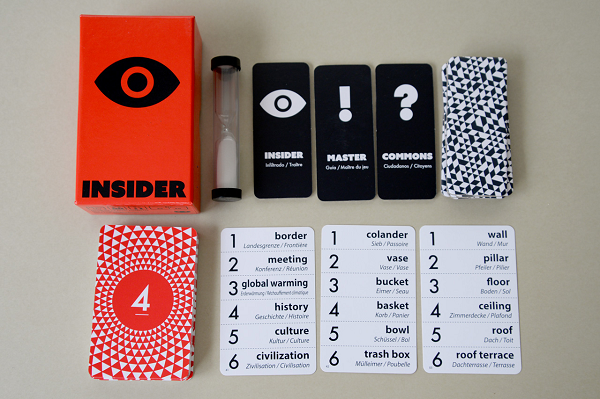Can You Guess the Word and Find the Traitor in Insider?

What could the word be? It’s bigger than a bread box but can only be found inside? Choose your yes and no questions carefully but also pay attention to what everyone else is asking, because one player already knows what the word is — and if he’s not caught at the end you’ll lose the game.
Published by Oink Games, Insider is a social deduction, word guessing party game for 4-8 people. It's light, portable, and extremely easy to play on the go.
Gameplay
The role tiles are mixed and one is handed to each person. There are three types of roles. One person is the master, one is the insider, and everyone else are commons. If you are the master you reveal the tile to everyone; otherwise, your role is kept secret.
Everyone closes their eyes except for the master. He takes the stack of word cards, draws the top card, and turns it face-up. Each word card has six words, numbered one through six. The back of each card also has a number on it, one through six. He consults the number on the back of the card that is now on top of the deck. This will tell him which of the six words on the drawn card is the word for this round.
He then closes his eyes and tells the insider to open her eyes. The insider sees what the word is and then closes her eyes again. After giving the insider enough time to see the card, the master opens his eyes, replaces the revealed card face-down on top of the deck, and tells everyone to open their eyes.
The timer is started. All the other players ask the master yes or no questions about the word to try to deduce what it is. The master can only answer with 'yes', 'no', and 'I don't know'. The insider will be asking questions, too, and trying to lead the commons players towards the correct word without being too obvious. There is also no penalty for guessing what the word is and being wrong. You can guess multiple words.
If the players do not guess the word before the timer runs out, everyone loses. If they guess the word before the timer runs out, the timer is then reset and everyone has until the time runs out to discuss who they believe the insider to be (the master joins in the discussion too).
Next is the voting phase. First, everyone votes on whether they think the player who correctly guessed the word is the insider. He then reveals his role. If he had the majority of votes and he is not the insider, the real insider wins. If he was the insider, the master and the commons win. If he was a commons and did not have the majority vote, then players move on to the final voting phase where everyone votes on the player they believe is the insider. If the insider ends up with the majority of votes, then he loses and everyone else wins. Otherwise, the insider is the sole winner.

Review
Insider is an excellent party game with a fun twist on familiar gameplay. The fact that the insider is actively trying to help guide the other players to the correct word sets this game apart and requires players to think along different lines. The insider has to figure out how not to be too obvious, the master is looking for questions that seem a little too pointed, and everyone else has to juggle trying to deduce the word with remembering who has asked what.
The words also come in a wide range and some of them can be quite difficult to guess, so the insider does often have to choose carefully picked questions in order to lead players in the right direction. Trying to hide that among all the other questions can be tricky. The discussion phase can also be a lot of fun, as players try to explain why they chose certain questions and what led them, logically, in those directions.
Depending on your player group, it can work better to have players take turns asking questions with the option to pass if they can’t think of anything, otherwise quieter players can get a little lost in the crowd.
The number of players is limited by the number of role tiles, which is unfortunate because the game does work with more players. You can have people team up and it works pretty well, but a few more role tiles would have been a good addition since it does play so smoothly with larger groups.
This is an extremely portable party game. The box it comes in is quite small and easy to slip into a purse or pocket, and you can play the game pretty much anywhere. We’ve played it on the beach, at wedding receptions, standing in line, and once in a while even at regular game tables. It’s an easy game to teach, and players with a wide range of gaming experience can enjoy it. It’s one we keep coming back to, no matter how many social deduction party games keep coming out, both because of its size, the ease of teaching, and because the gameplay is just thoroughly fun and fast.
Pros: Can be played pretty much anywhere, works with a wide range of player counts, rounds are fast, all roles are fun
Cons: Could use more role tiles, you may need to tweak the rules of the question phase depending on your game group







